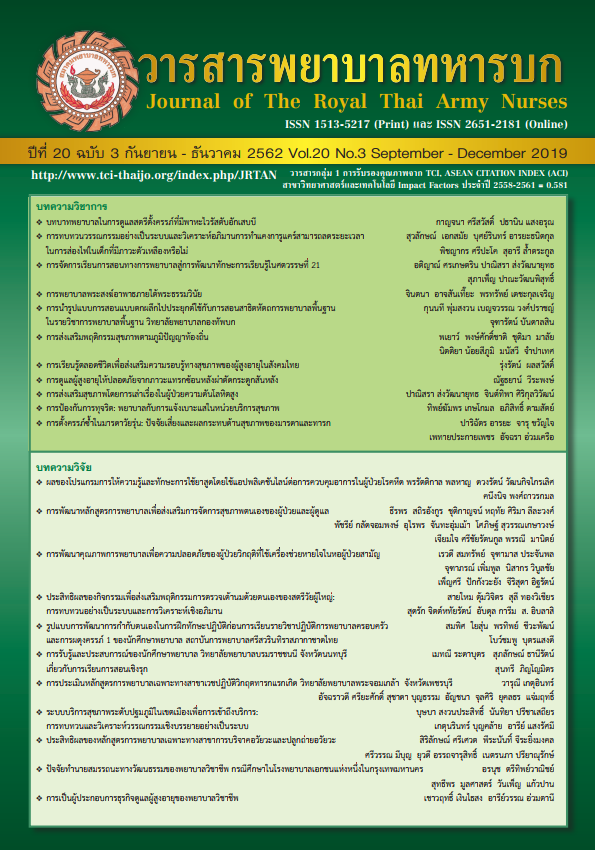A Confirmatory Factor Analysis of Digital Competency of Thai Professional Nurses
Keywords:
Digital competency, Professional nurse, Confirmatory factor analysisAbstract
The purpose of this descriptive research was to validate the fitness of digital competency components of Thai professional nurses. The sample comprised 300 nurses from 13 hospitals under the Ministry of Public Health who responded questionnaires and were selected by the multi-stage random sampling technique. The research instrument were an online questionnaire of digital competency components of Thai professional nurses. The content validity of the questionnaire between 0.6 and 1.0 based on index of item objective congruence by five experts. The reliability of the questions was 0.97 based on Cronbach’s alpha reliability coefficient method. The data were analyzed by using frequency, percentage, mean, standard deviation, and confirmatory factor analysis. The results illustrated that digital competency of Thai professional nurse’s embraced three components with 22 competencies as follows: 1) knowledge component was defined by seven competencies, 2) skills component was defined by eight competencies, and 3) attributes component was defined by seven competencies. The digital competency components of Thai professional nurses was fit to the empirical data including chi-square () = 314.68; degrees of freedom (df) = 182; p < 0.01;
= 1.73; comparative fit index (CFI) = 1.0, goodness of fit index (GFI) = 0.91; adjusted goodness of fit index (AGFI) = 0.88; root mean square error of approximation (RMSEA) = 0.049; standardized root mean square residual (SRMR) = 0.022
Downloads
References
2. Ministry of Information and Communication Technology. Thailand digital economy and society development plan. Bangkok: Ministry of Information and Communication Technology; 2016.
3. Srisatidnarakul B. Strategic management of health care system in an era of Asean economic community. Pathum Thani Thammasat Printing House 2017.
4. Thimbleby H. Technology and the future of healthcare. Journal of Public Health. 2013;2(3):160-167.
5. Wonganantnont P. Nursing informatics. Journal of The Royal Thai Army Nurses. 2014;15(3):81-85. (in Thai)
6. Shaw T, Hines M, Kielly-Carroll C. Impact of digital health on the safety and quality of health care. Sydney: ACSQHC; 2017.
7. Thangkratok P. A study of digital competency components of Thai professional nurses. Nontaburi School of Nursing, Sukhothai Thammathirat Open University; 2018.
8. University of Victoria. What makes up a competency?. Victoria: Co-operative Education Program & Career Services; 2018.
9. Stephanie C, Riina V, Yves P. DigComp 2.1: The digital competence framework for citizens with eight proficiency levels and examples of use. Luxembourg: Publications Office of the European Union; 2017.
10. Hair JF, Black WC, Babin BJ, Anderson RE. Multivariate data analysis. 7th ed. Englewood Cliffs: Prentice Hall; 2010.
11. Kline RB. Principles and practice of structural equation modeling: methodology in the social sciences. 2nd ed. New York: Guilford Press; 2005.
12. Hooper D, Coughlan J, Mullen M. Structural equation modelling: guidelines for determining model fit. Electronic Journal of Business Research Methods. 2008;6(1):2.
13. Diamantopoulos A, Siguaw JA. Introducing LISREL: a guide for the uninitiated. London: Sage Publications; 2000.
14. Ala-Mutka K. Mapping digital competence: towards a conceptual understanding. Luxembourg, Spain: Publications Office of the European Union; 2011.
15. Chouhan VS, Srivastava S. Understanding competencies and competency modeling: a literature survey. IOSR Journal of Business and Management. 2014;16(1):14-22.
16. Langdon D, Whiteside K. Bringing sense to competency definition and attainment. Performance Improvement. 2004;43(7):10-15.
17. Health Education England. Improving Digital Literacy. Leeds: HEE;2018.
18. Bartholomew K, Curtis K. High-tech, high-touch: Why wait? Nursing Management. 2004;35(9):48-54.
19. Wiputthanupong C, Pensirinapa N, Sitakalin P. Use of information technology for evidence-based practice among registered nurses at Bhumibol Adulyadej hospital. Journal of Safety and Health. 2016;9(31):37-44.
20. Wonganantnont P, Anuchon S. Information technology for aging society. Journal of The Royal Thai Army Nurses. 2018;19(3):27-32. (in Thai)
Downloads
Published
How to Cite
Issue
Section
License
บทความหรือข้อคิดเห็นใดใดที่ปรากฏในวารสารพยาบาลทหารบกเป็นวรรณกรรมของผู้เขียน ซึ่งบรรณาธิการหรือสมาคมพยาบาลทหารบก ไม่จำเป็นต้องเห็นด้วย
บทความที่ได้รับการตีพิมพ์เป็นลิขสิทธิ์ของวารสารพยาบาลทหารบก
The ideas and opinions expressed in the Journal of The Royal Thai Army Nurses are those of the authors and not necessarily those
of the editor or Royal Thai Army Nurses Association.






